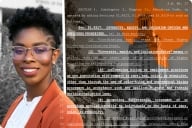You have /5 articles left.
Sign up for a free account or log in.
NEW YORK -- When Matthew Connelly was looking at graduate schools, he knew that his application wouldn't land naturally on any one historian's pile to review. The departments, he said, were made up of "Americanists, Europeanists, and otherists." Connelly, now an associate professor of history at Columbia University, was none of the above. He wanted to explore ideas related to Algeria's independence from France, but didn't want to be called a scholar only of French colonialism or only of North Africa, and he didn't want to restrict himself to the power of governments and the military. The ideas associated with that revolt don't belong just with one topic, he said Saturday at a session of the annual meeting of the American Historical Association.
Connelly is a proponent of "transnational" history, a field that is still being defined. Some people have been doing it for a long time, and the name has been used for several years now. But in a sign that it is achieving a critical mass of scholars and putting down roots, the AHA held a session on "doing transnational history" in order to highlight both some of the promising work and the efforts to support scholars who do it.
While some people use "transnational" and "international" and "global" interchangeably, those on the panel Saturday and other leaders in the field tend to view transnational as more than just international or global. The focus on transnational is on movements or ideas or conditions that cross national borders and that are not best examined through the structure of the nation-state. So somebody could do research comparing key events that took place in various countries, doing lots of comparative work about government leaders and their actions, and that would be global or international, but not transnational.
Many of the most significant developments in history -- whether in religion, philosophy, the environment, or other aspects of life -- happen "irrespective of national identities," said Akira Iriye, a professor of history at Harvard University. "It's a very exciting moment in the profession to see so many historians moving in this direction."
Erika A. Kuhlman, associate professor of history and director of women's studies at Idaho State University, offered an illustration of why. She studies gender and war, and noted that war -- commonly fought between nation-states --- would seem like an unlikely topic to consider without the organizing framework of the nation-state. But looking at the end of World War I from a transnational gender perspective, rather than a traditional focus on which countries won and which lost, reveals that women saw rights and positions eroded in the post-war years -- whether they were living in the "winners" or "losers" of the conflict. "Patriarchy was re-instituted by shunting women back to their roles of wife and mother," she said.
Pierre Yves Saunier of the Centre National de Recherche Scientifique, in France, is applying a transnational history approach to the study of nursing. He noted that children's novels over the years to encourage girls to enter nursing have similar heroic themes, and that nursing education developed along similar principles over the years in different countries with differing educational systems. Nursing is important in understanding the history of medicine, the role of gender in providing medicine, and public health -- and its history isn't about countries, Saunier said.
Dominic Sachsenmaier, an assistant professor of history at Duke University, said he sees the growing interest in transnational history as a worldwide trend. In fact, he said that it is easier for American scholars to ignore these trends and to adopt a country-specific approach than it is for scholars elsewhere. When Americans focus on other countries, but do so from a traditional perspective, there is a risk of an "over-emphasis on otherness," which "carries the danger of exoticizing scholarship about different parts of the world."
Sachsenmaier added that it was important not only to adopt the "new conceptual endeavor" of transnational approaches, but to consider "structural changes" in the academy to support the research.
Connelly of Columbia described several such efforts. He led efforts to get the university's history department to create a transnational/global history track in its doctoral program, to get away from the "Americanist, Europeanist, otherist" divide he once faced. Now, the department is receiving 50 applications a year for just a few slots in the program, and Columbia recently awarded its first Ph.D. through the program, Connelly said, to Sam White, now an assistant professor of history at Oberlin College, who did his dissertation on climate change -- an issue not restricted to any one state or time -- in the Ottoman Empire.
Of course, if departments are going to recruit graduate students to do transnational history, "we need places for them to publish," said Connelly. Many traditional venues have been organized the way history departments used to be, he said.
Several recent efforts indicate change. Connelly is co-editor of a new series on transnational history by Columbia University Press. Another series on transnational history was recently started by Palgrave Macmillan, which is also bringing out the Palgrave Dictionary of Transnational History.
Some observers here said that they believe transnational history has the potential to lead to dramatic changes in the profession. Rana Mitter, a professor of history at the University of Oxford, said that transnational approaches could change history from a "lone scholar" discipline to one more like "a physics lab," with group contributions. "The inability of all of us to learn 15 languages or cope with 17 different archives” could encourage "a more team-based type of historical practice," Mitter said. While some have long advocated such a shift, transnational methodologies could be "a motivation to make it happen."








